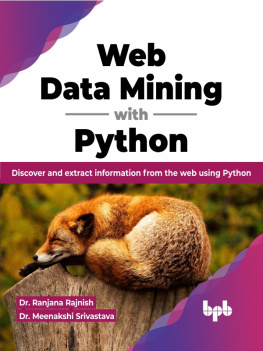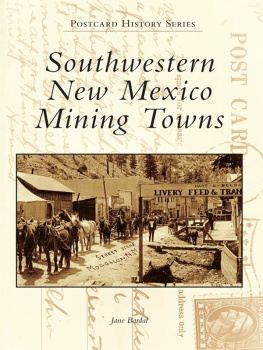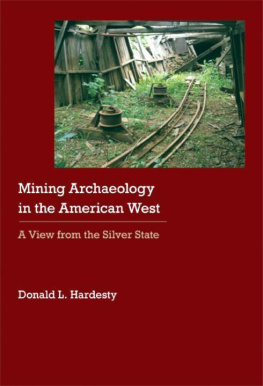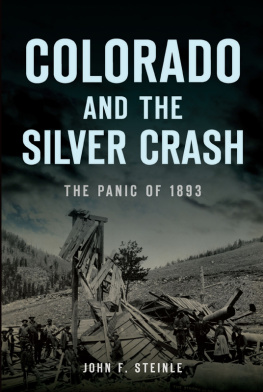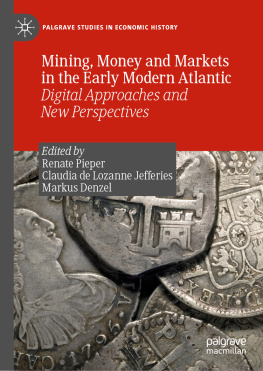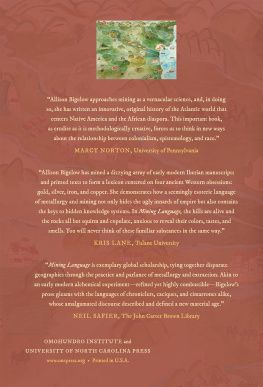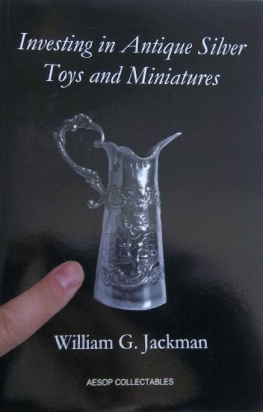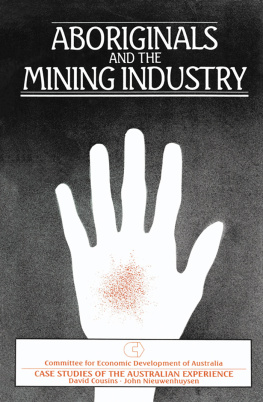THE UNDERGROUND WEALTH OF NATIONS
YALE SERIES IN ECONOMIC AND FINANCIAL HISTORY
Sponsored by the International Center for Finance, Yale School of Management
General Editors
Howard Bodenhorn
Clemson University, Department of Economics
William N. Goetzmann
Yale University, School of Management
K. Geert Rouwenhorst
Yale University, School of Management
Eugene N. White
Rutgers University, Department of Economics
The Underground Wealth of Nations
ON THE CAPITALIST ORIGINS OF SILVER MINING, A.D . 11501450
JEANNETTE GRAULAU

Published with assistance from the Louis Stern Memorial Fund.
Copyright 2019 by Jeannette Graulau. All rights reserved. This book may not be reproduced, in whole or in part, including illustrations, in any form (beyond that copying permitted by Sections 107 and 108 of the U.S. Copyright Law and except by reviewers for the public press), without written permission from the publishers.
Yale University Press books may be purchased in quantity for educational, business, or promotional use. For information, please e-mail (U.K. office).
Set in Times Roman type by Integrated Publishing Solutions, Grand Rapids, Michigan.
Printed in the United States of America.
Library of Congress Control Number: 2019937183
ISBN 978-0-300-21822-0 (hardcover : alk. paper)
A catalogue record for this book is available from the British Library.
This paper meets the requirements of ANSI/NISO Z39.48-1992
(Permanence of Paper).
10 9 8 7 6 5 4 3 2 1
To Arstides Rodrguez Rivera and Jos Pepe Gonzlez Daz, with admiration, and Luis Vzquez Gonzlez, in memoriam
CONTENTS
ILLUSTRATIONS
TABLES
PREFACE
MEN OBTAIN WEALTH FROM THE bowels of the earth, and not from the surface-soil, stated an English professor two centuries ago, a wrathful pedagogue contending with the weighty matter of capitalist improvements of lands. He had many reasons for agitation. How capital digged, usurped, and claimed the bowels of the earth in search of metallic wealth is an inquiry ignored by the political economy canon. This inquiry is the subject matter of this book.
The key to understanding capitalist mining comes from a view toward the complex totality of mining history. Once mining promontories were drawn, with their varied geography, a pattern became discernible: empty feudal coffers in the long thirteenth century were to the mines what the Black Death was in the fourteenth century. They were obstacles to mining. This did not come as a surprise to feudal lords, who were aware of their incapacity to make the mines productive. Capital came to the rescue and ploughed back its gains into the subsoil in unrepentant ways. The outcome was unequivocal: Europes mining feodum dispensed with feudal lords from the thirteenth century onward, but never with capital. That this took place before the sixteenth century means that the ashes into which the mining question was burnt by Smith and Marx hide a fire beneath!
A few intuitions guided the inquiry of this book. First, that capitalist silver mining did not originate in the sixteenth century, with the beginnings of an ill and deficient nation-state. This, despite the indefatigable efforts by world system scholars to show otherwise. The capitalist heart of the mining business was born centuries earlier, from distinctive capitalist structures. Second, that the toil and trouble that mining requires, today as in the past, admits of no reductionist explanation. Perfect freedom, of the type guiding the individual man portrayed in The Wealth of Nations, chose not to roam in the mines of the world. Liberty belonged instead to the medieval mining corporation, enjoying favorable conditions for taking over the mines from feudal lords. Third, that Emir Sader was right when he wrote that history moves swiftly from one mode of production to the next is no longer appealing nor sufficient for studying the evolution of land, labor, and capital on a global scale.
The book is motivated by the conviction that capitalism took diverse routes de terre while in the making. That which took place in the mining lands of Western Europe eight hundred years ago will not happen again and could not be replicated anywhere else. There, mining societies and cultures seemed destined for the natural progress of wealth, but one that required turbulence and contradictions as well as social order.
The time is ripe for a dispassionate look at how capitalism transformed these mining lands, but only if one is willing to leave the weighty burden of the agrarian question behind. This is as much a generational quest as it is a theoretical paradigm. Leaving the agrarian question behind means opening the door to new questions in the spheres of economic theory and history. The burden of patiently digging for a vein and following its course to the end means penetrating the underground world armed to the teeth, but vigilant and aware of the unexpected. Why did mining corporations succeed in the Latin West? Was Islam too rigid and inflexible toward the economic life of mining? How did the European medieval mining corporation lose its battle against the nascent state from the late fifteenth century onward? These are unexpected questions that occur over and over again in the book, and ones that admit of no easy answer.
This book is also guided by the belief that it is imperative to build an economic theory of mining, adhering to the procedure that many decades ago Sombart described as that of the mathematician, who takes out the letter recurring in all values and places it before a bracket, so that he says a(b+c+d... ) instead of ab+ac+ad. An economic theory of mining must start with general postulates and must explain the present state of affairs in connection to the past.
Lastly, there is a temperamental bias of mine that vindicates my asking the question of capitalist mining. I believe there is only one question that matters in political economy theory and history, at the expense of many other interesting but distracting affairs. It is a question that Marx borrowed from Thnen, and one that still lingers in the air: How has the labourer been able to pass from being master of capitalas its creatorto being its slave?
ACKNOWLEDGMENTS
MANY PEOPLE HAVE CONTRIBUTED in one way or another to this book. My political science colleagues have supported my research and teaching interests in ways that make me feel very fortunate. My gratitude also goes to Dennis O. Flynn, for supporting unconditionally my quest. Many thanks to them for the times we have spent together arguing about how best to elucidate an economic theory of mining.
Research leading to this book was completed with generous support from the Research Foundation of The City University of New York. My thanks go to all grant officers who assisted my navigating through institutional procedures. My thanks to Dean Edward Jarroll, who was always supportive, as were my colleagues in the Political Science Department, especially Ira Bloom and Donna Kirchheimer. The generous support by the Lehman College Foundation allowed me to obtain image-licensing rights for many of the illustrations contained in the book. In the Office of the Dean, many thanks to Shawn Plant for his readiness in assisting me with grant matters.
A book of this sort is never the building of one individual. The disinterested assistance of scientists whom I have met along the way brought wise advice and much joy to my research endeavors. Petrologist Gabriele Cruciani, from Universit degli Studi di Cagliari, allowed me to have firsthand unpublished pictorial material about geoheritage sites of Iglesias, Sardinia. The Associazione Amici della Miniera courteously responded to my information requests. The long hours of dialogue with economist Dennis O. Flynn were instrumental in my grasping of the significance of the silver question in global and monetary history. I am indebted to Dennis for the sagacity and candor with which he embraced my questions. The challenging and stimulating e-mail exchanges with Peter Claughton, archeologist and mining historian at the University of Exeter, allowed me to understand technical aspects of mining that were absent from my training as a political economist. His keen eye for details proved that a single fact was worth a shipload of arguments. These colleagues support, kindness, and rigor made them invaluable contributors to this book. The shortcomings that this book may contain are only an expression of my faults, and they are in no way the result of lack of my intellectual guidance.
Next page

